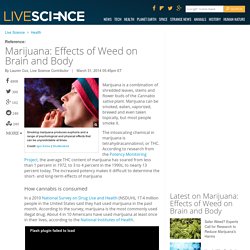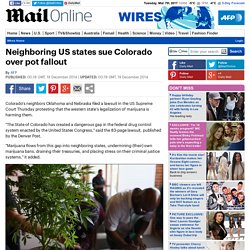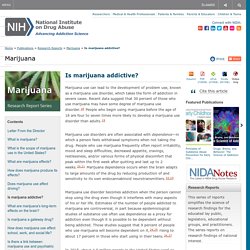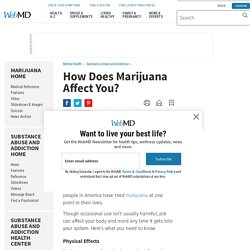

Marijuana: Effects of Weed on Brain and Body. Marijuana is a combination of shredded leaves, stems and flower buds of the Cannabis sativa plant.

Marijuana can be smoked, eaten, vaporized, brewed and even taken topically, but most people smoke it. The intoxicating chemical in marijuana is tetrahydracannabinol, or THC. According to research from the Potency Monitoring Project, the average THC content of marijuana has soared from less than 1 percent in 1972, to 3 to 4 percent in the 1990s, to nearly 13 percent today.
The increased potency makes it difficult to determine the short- and long-term effects of marijuana In a 2010 National Survey on Drug Use and Health (NSDUH), 17.4 million people in the United States said they had used marijuana in the past month. Prehistoric Van Goghs: Artists Used Pointillism 38,000 Years Ago Nineteenth-century artists, such as Georges Seurat and Vincent van Gogh, weren't the first to use pointillism, according to a discovery of 38,000-year-old decorated limestone tablets in France. National Institute on Drug Abuse (NIDA) What is medical marijuana?

The term medical marijuana refers to using the whole, unprocessed marijuana plant or its basic extracts to treat symptoms of illness and other conditions. The U.S. Food and Drug Administration (FDA) has not recognized or approved the marijuana plant as medicine. However, scientific study of the chemicals in marijuana, called cannabinoids, has led to two FDA-approved medications that contain cannabinoid chemicals in pill form.
Continued research may lead to more medications. Because the marijuana plant contains chemicals that may help treat a range of illnesses and symptoms, many people argue that it should be legal for medical purposes. Why isn’t the marijuana plant an FDA-approved medicine? Neighboring US states sue Colorado over pot fallout. By Afp Published: 00:18 GMT, 19 December 2014 | Updated: 00:18 GMT, 19 December 2014 Colorado's neighbors Oklahoma and Nebraska filed a lawsuit in the US Supreme Court Thursday protesting that the western state's legalization of marijuana is harming them.

"The State of Colorado has created a dangerous gap in the federal drug control system enacted by the United States Congress," said the 83-page lawsuit, published by the Denver Post. "Marijuana flows from this gap into neighboring states, undermining (their) own marijuana bans, draining their treasuries, and placing stress on their criminal justice systems," it added. A cannabis plant greets job seekers as they sign in at CannaSearch, Colorado's first cannabis job fair, on March 13, 2014 in Denver, Colorado ©Doug Pensinger (Getty/AFP/File) Colorado became the first US state to legalize marijuana for recreational use in January, where it was already allowed for medicinal use. "These guys are on the wrong side of history. US lawmakers, drug enforcement clash on marijuana law. Washington: US lawmakers who support steady relaxation of state laws on marijuana sparred on Tuesday with Obama administration officials who continue to label the drug in the same high-danger category as heroin.

The Drug Enforcement Administration's chief deputy said marijuana deserved to remain listed as a "Schedule 1" narcotic - a list which includes severely addictive drugs including LSD and ecstasy - even though he could not identify a single fatal overdose attributable to cannabis last year. "Marijuana is the most widely available and commonly abused illicit drug in the United States," the DEA's Thomas Harrigan told a House panel in a joint statement with John Walsh, the US attorney in Colorado, which along with Washington state legalized recreational marijuana use this year. They said abuse among young Americans is on the rise, with marijuana's more potent production methods and increased trafficking by international drug cartels the growing concerns.
"We've locked people up. National Institute on Drug Abuse (NIDA) Marijuana use can lead to the development of problem use, known as a marijuana use disorder, which takes the form of addiction in severe cases.

Recent data suggest that 30 percent of those who use marijuana may have some degree of marijuana use disorder.18 People who begin using marijuana before the age of 18 are four to seven times more likely to develop a marijuana use disorder than adults.19 Marijuana use disorders are often associated with dependence—in which a person feels withdrawal symptoms when not taking the drug. People who use marijuana frequently often report irritability, mood and sleep difficulties, decreased appetite, cravings, restlessness, and/or various forms of physical discomfort that peak within the first week after quitting and last up to 2 weeks.20,21 Marijuana dependence occurs when the brain adapts to large amounts of the drug by reducing production of and sensitivity to its own endocannabinoid neurotransmitters.22,23.
Marijuana: How Does It Affect You? Gallup Analytics: “In U.S., 38% Have Tried Marijuana, Little Changed Since '80s.”

Harvard Medical School: “Medical Marijuana and the Mind.” National Institute on Drug Abuse: “Drug Facts: Marijuana.” National Institute on Drug Abuse (NIDA)